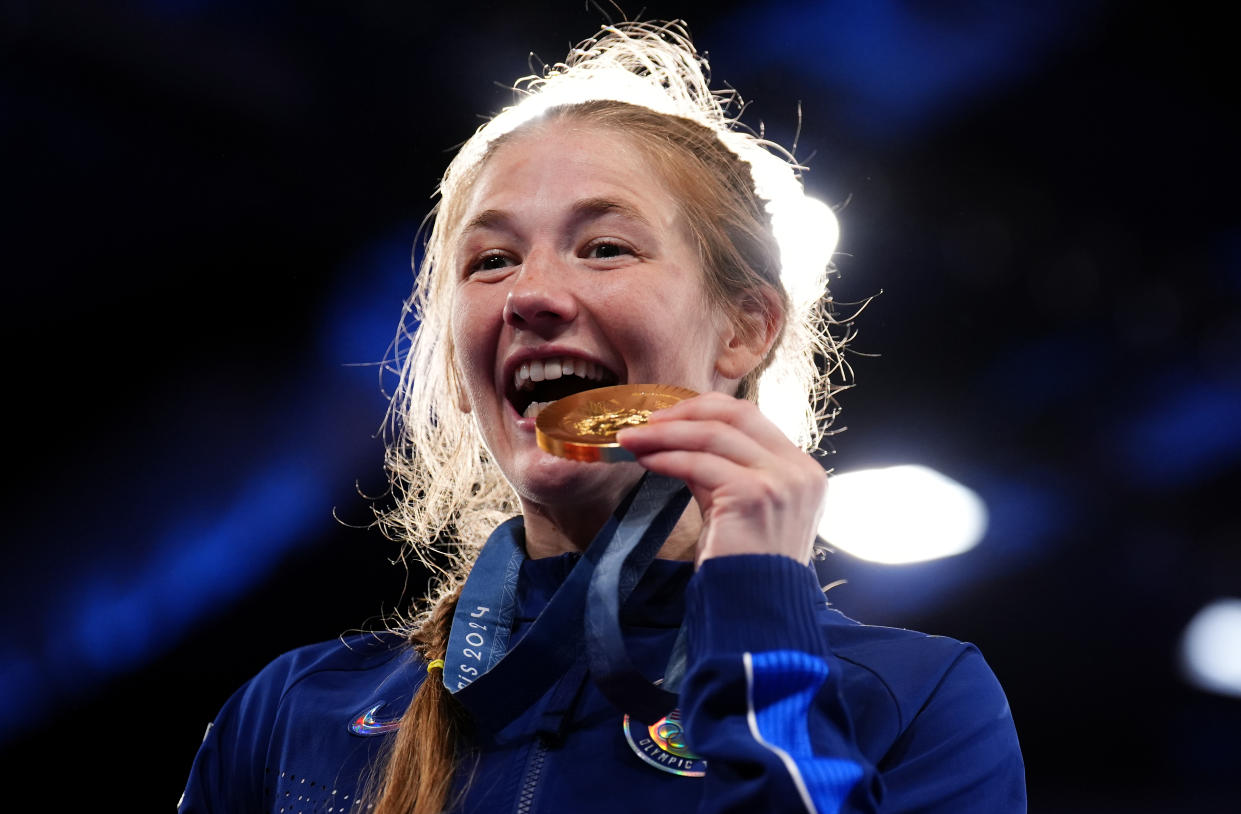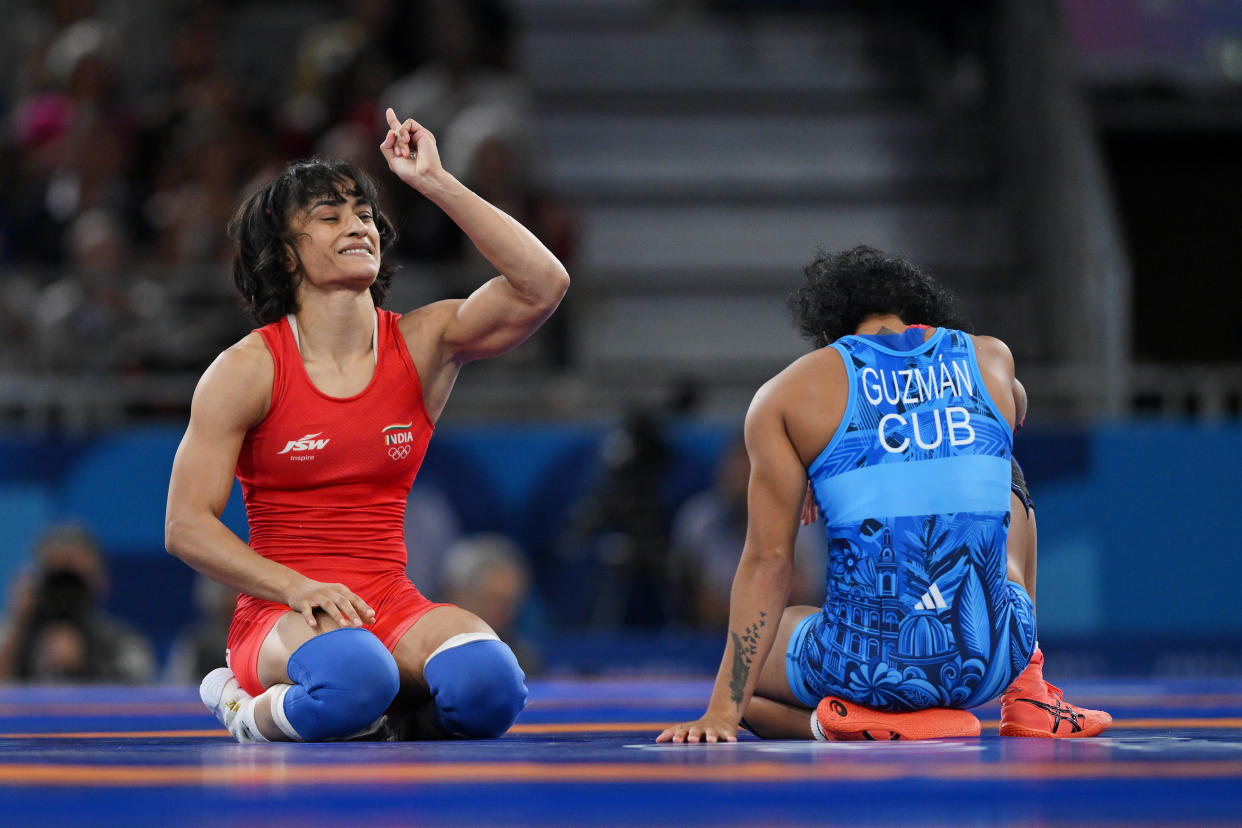Inside Olympic wrestling’s ‘chaos’: Weight-cut heartbreak, national outcry, premature parties, breakthrough gold
Medal table | Olympic schedule |How to watch | Olympic news
PARIS — Sarah Hildebrandt went to bed at 1 a.m. and awoke at 4 to meet her golden moment. She checked her weight, which was “pretty good,” a fraction of a kilogram above her Olympic wrestling division’s 50-kg limit. So, at 6 a.m., she began a standard cut, hopping to and fro, dancing to Taylor Swift, “just a good little boogie,” the 30-year-old American said. Around 7, she went to weigh in for her gold medal bout, and that, she recalled, is when the “craziness” began.
It had already haunted India’s Vinesh Phogat all through the night. While Hildebrandt rested up for Wednesday’s final, Phogat, her opponent, was running. Phogat spent what should have been her proudest hours as a wrestler in a sauna, deprived of food and water, frantically trying to lose 6 pounds. As her 7:15 a.m. weigh-in approached, her support staff reportedly resorted to cutting her hair and drawing blood.
They got Phogat, whose natural body weight is 57 kg — roughly 125 pounds — down to 50.3, 50.2, 50.1.
But not 50. Instead, shortly after missing weight, Phogat reportedly fainted. She was hospitalized due to dehydration.
And Olympic wrestling’s wildest day spun off the rails.
In Paris, officials confirmed that Phogat would be disqualified and forfeit her medal.
In India, where she’d become a hero, the nation’s first-ever wrestling medalist, an outcry became an inquest, then hopeless appeals, then mourning.
“Everyone here is feeling as if someone in the family has died,” Indian wrestling coach Virender Dahiya said. “We don't know what has struck us. Everyone is shocked.”
And back in Paris, en route to breakfast, Hildebrandt’s phone began to burst.
Some people told her: “Congratulations!”
Her parents readied pastries and champagne.
"We were under the impression that it was a forfeit, so there was a lot of celebrating,” Hildebrandt recalled.
“I mean, we were crying,” her brother and training partner, Drew, said, “thinking we won.”

But it was right around then that Olympic officials contacted Yusneylis Guzman Lopez, who’d lost to Phogat in a semifinal 12 hours earlier, and, by rule, would now get an unusual second shot at gold.
“I didn't believe it,” Lopez told Yahoo Sports in Spanish. “[I felt] so many things together — excitement, sadness, joy.”
And Hildebrandt, a bubbly veteran who’d fallen just short of Olympic titles or world championships on five separate occasions in the past, got the corresponding call.
She would have to fight her way to the top of the podium; there would be no free pass. The message she remembers receiving over the phone was simple: “Be ready.” In one moment, it was: “Yes, 100%, you won.” The next: “Bring your shoes.”
A national outcry, a ‘dream come true’ and a nap
For an hour or two at the Champ-de-Mars, and in the Olympic Village, and in Hildebrandt’s Airbnb, there was confusion because all of this was unprecedented.
No Olympic finalist had ever failed to make weight. Wrestlers are required to weigh in on the morning of their first three matches, the Round of 16 through semifinals. They inevitably gain weight throughout the day; then they shed it prior to a second weigh-in the following morning. Every medalist in the history of the modern Olympics had been able to shed enough, and do what most wrestlers do: compete in a class below their natural body weight.
Then along came Phogat, who reportedly weighed 52.7 kg after a stunning string of Tuesday victories, the first over Japanese favorite Yui Susaki. She would need to lose more than 5% of her body weight in roughly 12 hours. And so, in an attempt to preserve her medal, she ventured into the dark side of the sport.
Weight-cutting, the practice of temporarily shedding pounds prior to pre-competition deadlines, is something of an accepted evil in wrestling. It’s “our first opponent,” Lopez said. It’s “definitely part of the job, and we all gotta get it done, as s***ty as it is,” Hildebrandt said.
But they felt for Phogat, because they knew her story. She’d exited the 2016 Olympics with a cruel quarterfinal injury. Five years later, a similarly brutal weight cut left her visually and cognitively impaired. To get to a third Games in 2024, she endured rough policing and retribution for protesting alleged sexual harassment by the then-president of India’s wrestling’s federation. And if that wasn’t enough, last year, she tore her ACL.

So, she’s an inspiration to millions of Indians. When news of her disqualification spread Wednesday, the first reaction, Indian journalists said, was disbelief. And then anger. On behalf of Phogat, they all felt wronged, and wondered: Should a woman who won at least a silver medal fair and square really be banished from the podium altogether?
They pleaded with United World Wrestling, the sport’s global governing body, to restore her silver.
Prime Minister Narendra Modi got in touch with the Indian Olympic Association’s president, and urged them to appeal — which they did, to UWW and to the Court of Arbitration for Sport, presumably to no avail.
The Indian wrestling federation, meanwhile, searched for blame. “The entire responsibility here is of her coach and the supporting staff,” its president said. “A probe should be done on how her weight increased.” Even politicians bickered over fault.
And all the while, as the firestorm erupted, Lopez relished a “dream come true.”
Hildebrandt settled in for a nap.
‘I have so much food to eat’
When they stepped into a tunnel at 9:45 p.m. for the 56th and final wrestling match of the wild day, Phogat’s name was still on the scoreboard; multiple Indian flags were still in the crowd; but the hero never appeared.
Instead, Hildebrandt took down Lopez. She won 3-0, and pranced across the mat with an American flag. She flung herself into a group hug with family members. She repeatedly brought her palms to her chest or her cheeks, overwhelmed by the emotions of a moment she frequently thought would never come.
As she stood atop the podium, her flag ascending toward the ceiling, she recalled all those thoughts. “The amount of times I've stood to the left or right, just hurting, so bad,” she said. She’d lost a semifinal in Tokyo. She’d finished second at worlds in 2018 and 2021. She’d taken bronze in 2022, and again in 2023, and after that defeat, she told her coach: “I can't do this again. It hurts too much.”
But she did it, after waves of self-doubt, in the strangest of circumstances, and after “the most insane thing” she’d ever experienced at a wrestling meet.
1 a.m. in Paris.
Sarah Hildebrandt, hours after a glorious, long-awaited gold medal, emerges from the wrestling venue — where her family and friends were waiting outside.
What a moment. pic.twitter.com/xgkDTtZ3kF— Henry Bushnell (@HenryBushnell) August 7, 2024
She walked into a post-match interview zone with a medal around her neck and a chocolate muffin in hand, and “dude,” she said, “food for the next two weeks is gonna be just, like, out of this world.”
She spoke openly about her “strict diet,” an inescapable facet of wrestling. She called herself a “veg-head.” She said her creativity in the kitchen had become cookbook-worthy.
She is “excited,” though, after a year and a half of dieting, to “put a little milk in my coffee, [and] salt the food a little extra more. Eggs instead of egg whites. Just normal things.”
And then, perhaps, a return for the 2028 Games?
“Oooh, I don't know, that's a long way away,” Hildebrandt said. “I have so much food to eat between now and then.”


